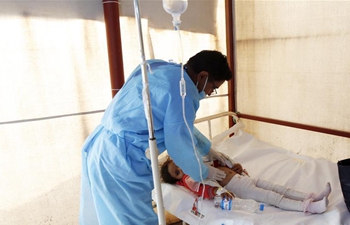BERLIN, April 25 (Xinhua) -- Although the number of asylum seekers in Germany has been declining, reservations against asylum seekers have been growing among the German population, a "Center Study" published by the Friedrich Ebert Foundation indicated on Thursday.
In 2019, 54.1 percent of Germans expressed negative opinions about asylum seekers, "the highest figure ever measured" in the studies since opinions on asylum seekers were first collected in 2011, according to researchers from the Institute for Interdisciplinary Conflict and Violence Research (IKG) at the University of Bielefeld, which led the study.
During the so-called refugee crisis in 2016, 49.5 percent of Germans had expressed a negative opinion about asylum seekers, which was already rising from around 44 percent in 2014.
Acceptance of hostile prejudices, particularly concerning immigrants and Muslims, as well as anti-Semitic views, has remained high among Germans since 2014, according to the IKG research team.
The researchers from Bielefeld said that "prejudices and devaluations are possibly already anchored as facts among Germans."
Although the majority of Germans "support democracy" and "welcome the diversity of society", one-third of respondents expressed non-liberal attitudes towards democracy and questioned equal rights for all, the study found.
"If the majority of respondents support democracy and its values, that is a good sign at first," said Wilhelm Berghan of Bielefeld University.
"At the same time, however, half of the respondents showed hostility towards asylum seekers and up to one third illiberal ideas of democracy. A part of the population does not live up to its own values," added Berghan.
In 2017, the German government adopted a National Action Plan Against Racism (NAP) which emphasized that "racism and discrimination constitute a violation of fundamental human rights" as well as threatening "social cohesion".
According to the NAP, "racism is more than just an integral ideological part of right-wing extremism and right-wing terrorism. Racist attitudes fall on fertile ground in all parts of society."
The "Center Study" published on Thursday found in particular that right-wing extremist attitudes were rejected by the majority of Germans, with only two to three percent of respondents clearly expressing such opinions.
In contrast, right-wing populist attitudes were "firmly anchored in the population," the IKG study stated.
Right-wing populist attitudes were determined by skepticism about democracy, approval of law-and-order authoritarianism and devaluations of immigrants, Muslims, asylum seekers and Sinti and Roma.
Although resentments against refugees exist across Germany, the "feeling of collective anger at immigration" was higher in East Germany at 52 percent, than in West Germany at 44 percent, the study found.
Nonetheless, the study showed some positive trends among Germans, such as a decline in sexism, prejudices against homeless people and people with disabilities.
The percentage of Germans surveyed who expressed negative opinions about homeless people dropped from 18 percent in 2016 to just under eleven percent in 2019.
Reservations against homosexuals had also decreased, finding resonance among only eight percent of Germans, the study showed.
Overall, the study found that Germany was on the one hand "a predominantly democratically oriented society". On the other hand, however, xenophobic and anti-democratic opinions had been hardening over time, driven partly by the proliferation of "new right attitudes" that asserted a belief in a "homogeneous people" and a resistance towards elites, media and politics.
The political center in Germany "is losing its solid ground and democratic orientation," the researchers from the University of Bielefeld concluded.
The "Center Survey", commissioned by the Friedrich Ebert Foundation, is a representative serial survey that measures right-wing extremist attitudes and "group-related misanthropy" in Germany and is conducted every two years.



















